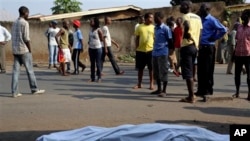The US Special Envoy for the Great Lakes Region of Africa Thomas Perriello has expressed grave concern about the ongoing political and humanitarian crisis in Burundi.
Perriello, who just returned from a trip to the region including a visit to Burundi, says there is a need for both the government and its opponents to be committed to negotiations in a bid to resolve the crisis. He says Burundians feel a high level of tension and anxiety due to the ongoing violence.
“We are deeply concerned about the political crisis and the humanitarian crisis," Perriello said. "We still believe there is a path forward, but it has to be one in which all Burundian leaders agree to a political dialogue, and the important leadership that the region has shown, through the East African Community, resumes with some urgency to address a situation where you’ve seen approximately over 200,000 [refugees] already and ongoing sporadic violence."
Civil society groups in Burundi say the apparent escalation of violence could slowly plunge the country into chaos and possibly a return to civil war. Their comments came after Come Harerimana, president of the CNDD FDD chapter in Kanyosha district, was killed Wednesday.
His murder is the third high profile attack in four days as the crisis in Burundi deepens. The African Union, East African Community (EAC) and the Burundian government have all called for calm following the recent killings.
Special envoy Perriello says it would be unfortunate for Burundi to lose the significant progress the country has made over the years since the end of the civil war in 2005.
“Burundians need to continue to hear those calls for calm and the path forward," said Perriello.
Ongoing Peace Talks
Opponents of President Pierre Nkurunziza say peace talks with the government have yet to get to the fundamental problems that are the reasons behind the tension and violence. They contend that Mr. Nkurunziza is to blame following his decision to seek and win re-election, despite protests that he violated both the constitution and the Arusha peace accord that effectively help ended the civil war.
Perriello says it is unlikely that the issues can be resolved until they come up in the talks.
“The United States and the international community are ready to support the regional leadership to force this political dialogue forward that is so important,” said Perriello.
“The point of the dialogue is to address these extremely difficult questions that continue to remain under the surface of the political crisis. But, people need to come to the table. We’ve seen very constructive steps forward when the East African Community and South Africa and others have been a constructive part of this. So, we are eager to resume that and stand ready to support it.”
Mediation
Former Burundi President Domitien Ndayizeye was quoted in a local newspaper as saying that the country needs a mediator with more global appeal to help end the crisis. His supporters say Ugandan President Yoweri Museveni, chosen by regional leaders to help negotiate a settlement, has not been overly effective.
Perriello says Museveni has played a constructive role so far.
“The United States and the international community are less dedicated to a specific individual or process than the overall momentum to resume this political dialogue with regional leadership from the EAC from the AU [African Union]. And that has to resume with a sense of urgency and importance because we do see things escalating. We have not passed the point of no return, we can see that kind of solution going forward,” said Perriello.





